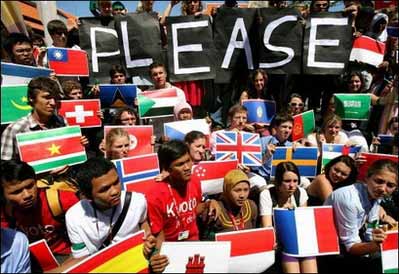 The 187 nation climate change talks in Bali ended on Saturday with an agreement to launch further negotiations after reluctant agreement from the US. The final text of the agreement has acknowledged that “deep cuts” in carbon emissions will be needed. The “roadmap” the parties agreed on included a 2009 summit in Copenhagen to negotiate a binding deal as well as in principle support for the 2050 target of halving worldwide emissions, supported by assistance to developing countries. The deal was concluded after the US dropped opposition to a proposal by the G77 main developing-nation bloc for rich nations to take the lead.
The 187 nation climate change talks in Bali ended on Saturday with an agreement to launch further negotiations after reluctant agreement from the US. The final text of the agreement has acknowledged that “deep cuts” in carbon emissions will be needed. The “roadmap” the parties agreed on included a 2009 summit in Copenhagen to negotiate a binding deal as well as in principle support for the 2050 target of halving worldwide emissions, supported by assistance to developing countries. The deal was concluded after the US dropped opposition to a proposal by the G77 main developing-nation bloc for rich nations to take the lead. There were some disappointments. The EU had pressed for binding carbon emission cuts of 25 to 40 per cent by 2020. While the US signed the eventual deal, the White House released a statement saying it had “serious concerns” about some aspects. It said the problems can not be solved by developed nations only, negotiations must differentiate developing countries by size of economy and emissions, and the commitment should favour the most vulnerable and least developed countries.
This is a coded call for India and China to do more. China's emissions are on par with those of the US but on a per capita level, each American emits far more than a Chinese. But the tide turned against the US in the conference after Al Gore made a major speech saying his country was "principally responsible" for blocking progress at the climate conference. However Russia and Japan joined the US in successfully opposing numerical targets.
But the official press release (pdf) from the UN Framework Convention on Climate Change (UNFCCC) painted the outcome as a strengthened climate change deal that offers a clear agenda for the key issues to be negotiated to 2009. The UNFCCC is the parent treaty of the Kyoto Protocol which expires in 2012 and the UN believes the decisions taken at Bali will pave the way for action to adapt to the negative consequences of climate change, reduce greenhouse gas emissions, deploy “climate-friendly” technologies and finance adaptation and mitigation measures.
Australia will not commit to binding targets until the independent climate change review led by ANU Economics Professor Ross Garnaut releases its findings. The review will examine the impacts of climate change on the Australian economy, and recommend medium to long-term policies and frameworks. It has the challenging goal of ensuring future prosperity while meeting international emission targets. The review is not scheduled to complete until end of September 2008 though there will be a draft report due end of June.
This delay left Prime Minister Kevin Rudd in an awkward position at Bali. Last week he was accused of working with Canada and Japan to sabotage the EU and G77 for binding commitments. But he emerged from the conference in triumph after Australia publicly supported including the advice of the UN's peak science body (IPCC) in a crucial secondary document that will become part of the Bali road map. This advice says emissions must be stabilised in the next 15 years if the world wants to avoid the worst impacts of climate change and keep global temperatures from rising 2 degrees. Australia’s role in getting this advice into the roadmap was praised by several NGOs including the Climate Institute and the Australian Conservation Foundation.
 Much remains to be done including solving the problem of how a carbon emissions market would work which protects poorer countries from deforestation. This is of particular importance to Indonesia and Brazil with their massive rainforests. Indian Science Minister Kapil Sibal also complained that the agreement was too vague on technology transfer. “They don't want to give us technology support. It says support for technology,” Sibal said. "What does support mean — support from where?"
Much remains to be done including solving the problem of how a carbon emissions market would work which protects poorer countries from deforestation. This is of particular importance to Indonesia and Brazil with their massive rainforests. Indian Science Minister Kapil Sibal also complained that the agreement was too vague on technology transfer. “They don't want to give us technology support. It says support for technology,” Sibal said. "What does support mean — support from where?" The likelihood is that by the 2009 talks in Copenhagen there will be a new regime in Washington. The world will hope that whoever represents the world’s worst emitter will come ready to play their part. Last Thursday, the UN released fresh data that showed that the temperature rise continues unabated. The World Meteorological Organisation (WMO) said that the last ten years to 2007 were the warmest on record citing data taken from a global network of weather stations, ships and buoys. According to Michel Jarraud, MWO’s secretary general, "It's very likely the warmest period for at least the last 1,000 or 1,300 years." Expect a lot more hot air at Copenhagen 2009.
No comments:
Post a Comment